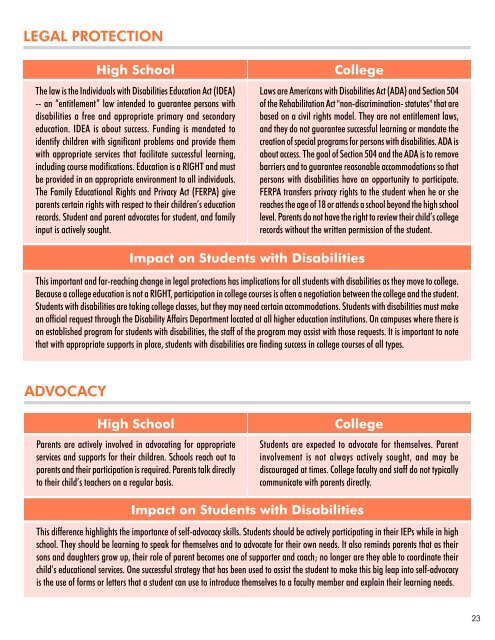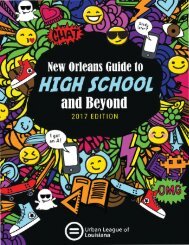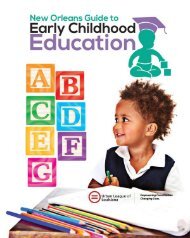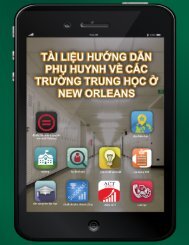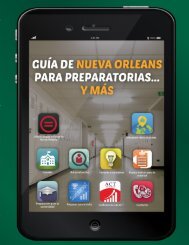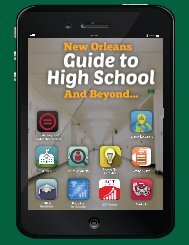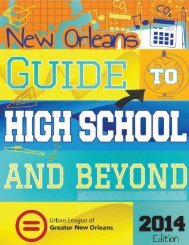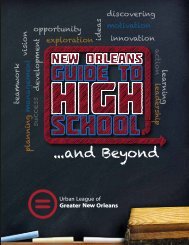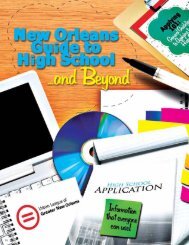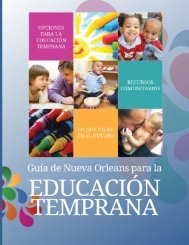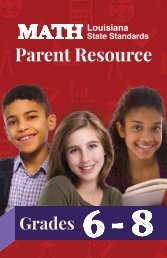New Orleans Guide to High School and Beyond 2018
You also want an ePaper? Increase the reach of your titles
YUMPU automatically turns print PDFs into web optimized ePapers that Google loves.
LEGAL PROTECTION<br />
<strong>High</strong> <strong>School</strong><br />
The law is the Individuals with Disabilities Education Act (IDEA)<br />
-- an “entitlement” law intended <strong>to</strong> guarantee persons with<br />
disabilities a free <strong>and</strong> appropriate primary <strong>and</strong> secondary<br />
education. IDEA is about success. Funding is m<strong>and</strong>ated <strong>to</strong><br />
identify children with significant problems <strong>and</strong> provide them<br />
with appropriate services that facilitate successful learning,<br />
including course modifications. Education is a RIGHT <strong>and</strong> must<br />
be provided in an appropriate environment <strong>to</strong> all individuals.<br />
The Family Educational Rights <strong>and</strong> Privacy Act (FERPA) give<br />
parents certain rights with respect <strong>to</strong> their children’s education<br />
records. Student <strong>and</strong> parent advocates for student, <strong>and</strong> family<br />
input is actively sought.<br />
College<br />
Laws are Americans with Disabilities Act (ADA) <strong>and</strong> Section 504<br />
of the Rehabilitation Act "non-discrimination- statutes" that are<br />
based on a civil rights model. They are not entitlement laws,<br />
<strong>and</strong> they do not guarantee successful learning or m<strong>and</strong>ate the<br />
creation of special programs for persons with disabilities. ADA is<br />
about access. The goal of Section 504 <strong>and</strong> the ADA is <strong>to</strong> remove<br />
barriers <strong>and</strong> <strong>to</strong> guarantee reasonable accommodations so that<br />
persons with disabilities have an opportunity <strong>to</strong> participate.<br />
FERPA transfers privacy rights <strong>to</strong> the student when he or she<br />
reaches the age of 18 or attends a school beyond the high school<br />
level. Parents do not have the right <strong>to</strong> review their child’s college<br />
records without the written permission of the student.<br />
Impact on Students with Disabilities<br />
This important <strong>and</strong> far-reaching change in legal protections has implications for all students with disabilities as they move <strong>to</strong> college.<br />
Because a college education is not a RIGHT, participation in college courses is often a negotiation between the college <strong>and</strong> the student.<br />
Students with disabilities are taking college classes, but they may need certain accommodations. Students with disabilities must make<br />
an official request through the Disability Affairs Department located at all higher education institutions. On campuses where there is<br />
an established program for students with disabilities, the staff of the program may assist with those requests. It is important <strong>to</strong> note<br />
that with appropriate supports in place, students with disabilities are finding success in college courses of all types.<br />
ADVOCACY<br />
<strong>High</strong> <strong>School</strong><br />
Parents are actively involved in advocating for appropriate<br />
services <strong>and</strong> supports for their children. <strong>School</strong>s reach out <strong>to</strong><br />
parents <strong>and</strong> their participation is required. Parents talk directly<br />
<strong>to</strong> their child’s teachers on a regular basis.<br />
College<br />
Students are expected <strong>to</strong> advocate for themselves. Parent<br />
involvement is not always actively sought, <strong>and</strong> may be<br />
discouraged at times. College faculty <strong>and</strong> staff do not typically<br />
communicate with parents directly.<br />
Impact on Students with Disabilities<br />
This difference highlights the importance of self-advocacy skills. Students should be actively participating in their IEPs while in high<br />
school. They should be learning <strong>to</strong> speak for themselves <strong>and</strong> <strong>to</strong> advocate for their own needs. It also reminds parents that as their<br />
sons <strong>and</strong> daughters grow up, their role of parent becomes one of supporter <strong>and</strong> coach; no longer are they able <strong>to</strong> coordinate their<br />
child’s educational services. One successful strategy that has been used <strong>to</strong> assist the student <strong>to</strong> make this big leap in<strong>to</strong> self-advocacy<br />
is the use of forms or letters that a student can use <strong>to</strong> introduce themselves <strong>to</strong> a faculty member <strong>and</strong> explain their learning needs.<br />
23


